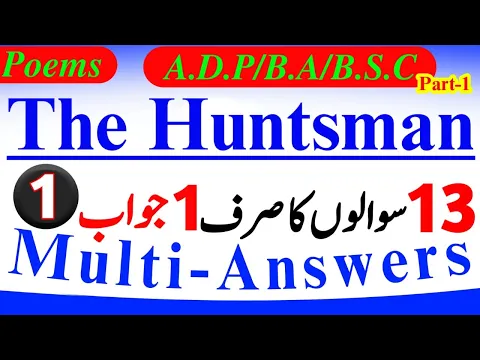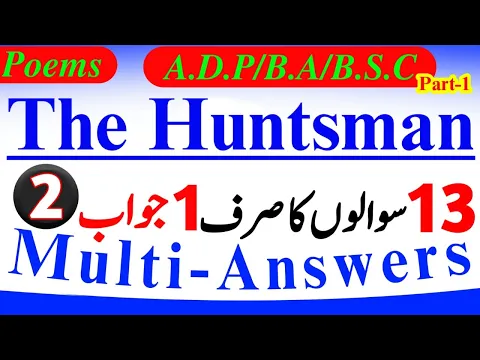BA English The Huntsman Poem Summary Questions PDF Notes Text is a very helpful guess paper and complete solution for English Students of universities, colleges, and schools also.
Download the Pdf File at the end of this article.
7. THE HUNTSMAN by Edward Lowbury
The Huntsman Poem Text | The Huntsman Poem Words | Content | Verses
Kagwa hunted the lion.
Though bush and forest went his spear.
One day he found the skull of a man
And said to it, “How did you come here”?
The skull opened its mouth and said
“Talking brought me here’.
Kagwa hurried home;
Went to the King’s chair and spoke;
‘In the forest I found a talking skull’.
The king was silent. Then he said slowly
‘Never since I was born of my mother
Have I seen or heard of a skull which spoke’.
The king called out his guards.
‘Two of you go with him
And find the talking skull;
But if his tale is a lie
And the skull speaks no word,
This Kagwa himself must die’.
They rode in the forest;
For days and nights they found nothing
At last they saw the skull; Kagwa
Said to it: How did you come here?
The skull said nothing. Kagwa implored,
But the skull said nothing.
The guards said ‘Kneel down’
They killed him with sword and spear.
Then the skull opened its mouth;
‘Huntsman, how did you come here?
And the dead man answered:
‘Talking brought me here’
The Huntsman Poem Summary Questions PDF Notes Text
The Huntsman Poem Explanation Line by Line | The Huntsman Poem Explanation With Quotes
- Kagwa hunted the lion,
- Through bush and forest went his spear,
- One day he found the skull of a man
- And said to it, ‘how did you come here?’
- And the skull answered, ‘talking brought me here.’
- Kagwa hurried home, went to the king’s chair, and spoke,
Lines 1-6
Kagwa used to hunt lions. One day he was wandering in a forest with his spear he saw a skull. He asked him the reason for his death. Strangely enough, the skull replied, “Talking brought me here”.
- “In the forest, I found a talking skull”
- The king was silent, then he said slowly,
- “Never since I was born of my mother
- Have I seen or heard of a skill which spoke.”
- The king called out his guards,
- “Two of you now go with him
Lines 7-12
Kagwa went home in a hurry. Then he went to the king’s court and told all about the talking skull. The king was silent for a while and then said, “I have never seen or heard about any talking skull throughout my life”.
- And find the talking skull;
- And if his tale is a lie
- And the skull speaks no word,
- This Kagwa himself must die.”
- They rode into the forest;
- For days and nights, they found nothing.
Lines 13-18
As the kings preserve their place by continuous and microscopic judgment so he called two of his guards and said to them, “Both of you should go with Kagwa and find this talking skull. If you find the skull and it does not talk, you should kill Kagwa at once”.
- At last, they saw the skull; Kagwa
- Said to it, “How did you come here?”
- The skull said nothing. Kagwa implored,
- But the skull said nothing.
- The guards said, “Kneel down”
- They killed him with a sword and spear.
Lines 19-24
Kagwa and the guards rode on their horses into the far forest. At last, they found the skull. Kagwa repeated the last question but the skull spoke nothing. Kagwa requested the skull to speak up but in vain.
- Then the skull opened its mouth,
- “Huntsman, how did you come here?”
- And the dead man answered,
- ‘Talking brought me here’.
Lines 25-30
The guards ordered the poor hunter to kneel down and killed him. After his death, the skull spoke and asked how he had come there. The dead man answered that it was careless talk on his part which brought him there. The suggestion is that one should be careful about one’s conversation. As Shakespeare remarks, “Men of few words are the best men”.
Comments:
The dramatic poem “The Huntsman” is full of suspense, satire, irony, worldly wisdom, and sick-humour.
The Huntsman Poem Reference to the Context with Explanation
Reference:
These lines have been taken from the poem “Huntsman” written by Edward Lowbury.
The Context:
In this poem, the poet conveys insight and forethought. The globe is full of many fools like Kagwa: they cannot be as acute as kings are. Kagwa, who is the master of the situation, becomes the hunted. He found a talking skull in the wood and disclosed the story before the king and led to his own death.
Explanation:
Note: The lines in brackets could be added to the beginning of the explanation of every stanza.
(The vocabulary of these lines is very simple and common may well be termed as a masterpiece. It suits to the theme of the poem, “Brevity is the soul of wit”)
The Huntsman Poem Important Questions and Answers
- What are the facts mentioned in the poem?
- What is the moral of the poem?
- Is it the Huntsman’s fate or folly that kills him?
- The poet draws our attention to a tragic fact of life -the Huntsman becomes the hunted – the prey to cruel remorseless fate. Discuss?
- Who is responsible for the death of the Huntsman?
- Why does the huntsman suffer in the hand of fate, is the rightly punished?
The Huntsman Poem Summary, Theme & Critical Appreciation
Multi-Answer For All The Above Questions
Note: You can write this answer for any question related to the poem The Huntsman!
The dramatic poem “The Huntsman” is full of suspense, satire, irony, worldly wisdom, and sick-humour. In this poem, the poet conveys insight and forethought. The globe is full of many fools like Kagwa; they cannot be as acute as kings are. The kings preserve their place by continuous and microscopic judgment. Thus in this poem, the king stands for wisdom and fate, and Kagwa symbolizes foolishness and mortality. Kagwa, who is the master of the situation, becomes the hunted. He found a talking skull in the wood and disclosed the story before the king and led to his own death.
The poem has many moral lessons. Firstly, never speak anything unless asked for and never speak much before dictators. Secondly, we should be careful about our conversation as Shakespeare remarks, “Men of few words are the best men”. Thirdly it tells, do not make haste and fourthly Man’s follies and absurdities always lead to destruction.
The vocabulary of the poem is very simple and common may well be termed as a masterpiece. It suits to the theme of the poem,
“Brevity is the soul of wit.”
“Shakespeare”
The Huntsman Poem Summary Questions Theme PDF Notes Text
These are some other questions that may be important according to the examination.
Discuss in detail the use of elements of suspense and irony in the poem.
Ans:-
1st Para of Multi Answer + This folk-lore is a good combination of suspense and irony too. In the first stanza, we read an unbelievable incident. Kagwa finds a talking skull which is magical. Suspense goes on from beginning to middle and end. Irony is a literary device that shows the reversal of a situation. When Kagwa requests to skull to speak something so that his life could be saved, irony prevails. The title of the poem is also ironic as Kagwa was the hunter but he became the hunted. The elements of suspense and irony create a dreadful impact overall.
- Is it the Huntsman’s fate or folly that kills him?
- The poet draws our attention to a tragic fact of life- the Huntsman becomes the hunted – the prey to cruel remorseless fate? Discuss.
- Who is responsible for the death of the huntsman?
- Why does the huntsman suffer in the hand of fate, is the rightly punished.
Ans:-
1st Para of Multi Answer + Every man cannot be perfect in every art, same was the case with Kagwa. He was not able to understand the real meanings of the words of the skull. He was not very intelligent but talkative. So he was hunted by his own fate and fault. Fate does not ask anybody that he wants to die or not. Death comes without man’s will.
“As flies to wanton boys are we to th’ gods. They kill us for their sport.”
Shakespeare
Man’s follies and absurdities always lead to destruction. Kagwa has to die for his stupidity and dull-mindedness in worldly wisdom. We can say that the huntsman is himself responsible for his death. Perhaps it is the law of nature
- Why do you think Kagwa informed the king of his strange experience in the forest?
- Narrate the story of the poem in your words.?
Ans:-
Kagwa used to hunt lions. One day he saw a skull. He asked him the reason for his death. Strangely enough, the skull replied, “Talking brought me here”. Kagwa came across an unusual thing in the forest. It was his feelings of pride and curiosity that forced him to report the matter to the king. King called two of his guards and said to them, “Both of you should go with Kagwa and find this talking skull. If you find the skull and it does not talk, you should kill Kagwa at once.” Kagwa and the guards rode on their horses into the far forest. At last, they found the skull. Kagwa repeated the last question but the skull spoke nothing. Kagwa requested the skull to speak up but in vain. The guards ordered the poor hunter to kneel down and killed him. After his death, the skull spoke and asked how he had come there. The dead man answered that it was careless talk on his part which brought him there. + 2nd Para of Multi Answer.
The Huntsman Poem Summary in Urdu
Topic list The Huntsman Poem Summary Questions Theme PDF Notes Text;
- The Huntsman poem questions and answers
- The Huntsman poem theme
- The Huntsman poem summary in Urdu
- The Huntsman poem figures of speech
- The Huntsman poem in English
- The Huntsman poem pdf
- The Huntsman poem critical appreciation
- The Huntsman poem explanation line by line
- The Huntsman poem meaning
- The Huntsman poem text
- The Huntsman poem words
- The Huntsman poem activities
- The Huntsman poem poetic devices
Watch this The Huntsman video lecture for the easy preparation of BA English Poems



Your article gave me a lot of inspiration, I hope you can explain your point of view in more detail, because I have some doubts, thank you.